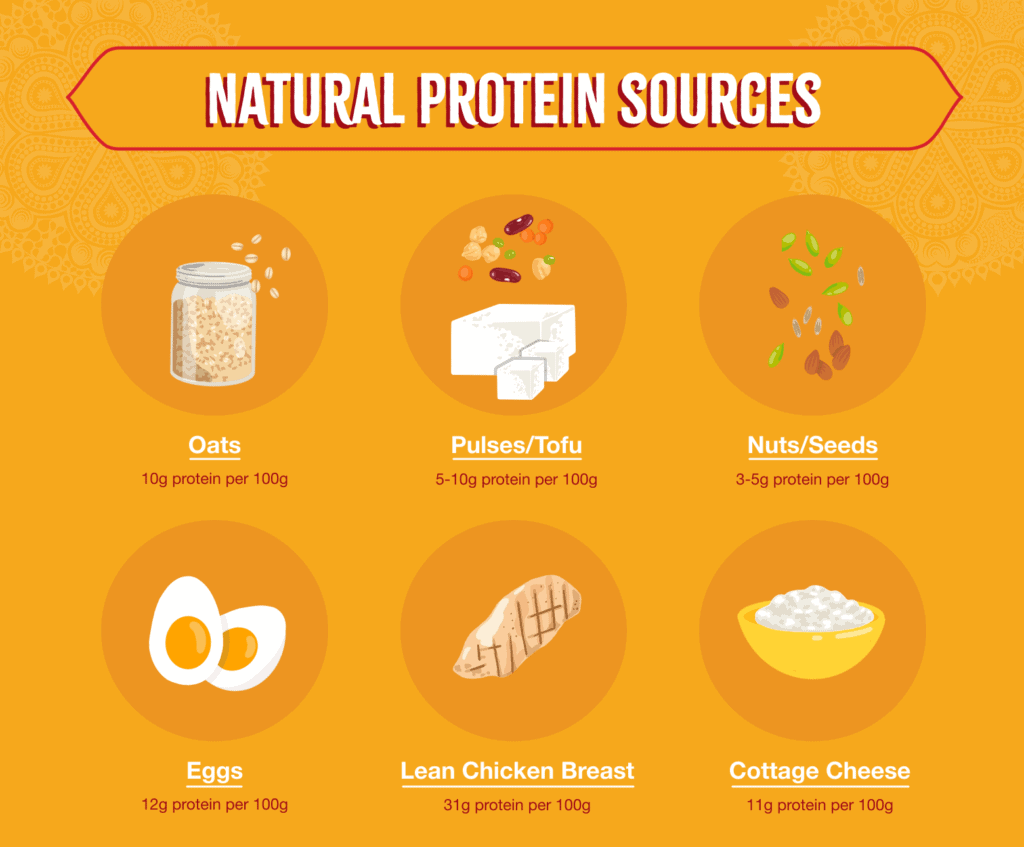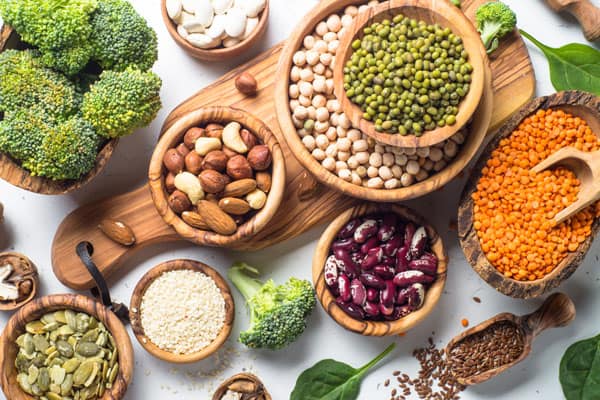Our Favorite Natural Protein Sources and High Protein Foods
Protein – you know you need it in your body, but do you know why? We’re talking through some of the best natural protein sources today!

What is Protein?
Many people know that protein is a key component of a healthy diet, but few know why that’s the case.
Protein is the key nutrient that powers the building and repairing of healthy tissue. It’s found all throughout the body, from your bone marrow to your biceps to your hair follicles. Protein is made up of around twenty different building blocks — these are called amino acids.
Nine of these amino acids are known as essential amino acids because your body can’t synthesize them on its own. Instead, you need to find these amino acids in the food you eat.
The Health Benefits of Protein
Protein is critical to a healthy body, so it should be no surprise that it has many natural health benefits.
If it’s cold and flu season, protein can help you out. If your muscles need repairing, protein should be your first choice.
Protein is an integral component of any healthy immune system. Without protein, your body won’t be able to fight off viruses. Bacteria protect the body against viruses and bacterial infections, so they can be very helpful in strengthening your immune system.
It can also help repair your muscle cells after an intense workout. That’s why you might see many workout mavens taking a protein drink post-sweat to help rebuild the tiny tears in their muscles. Protein can also help repair cells and make new ones. Additionally, it’s also said that protein can create a feeling of fullness and aid in weight loss.
How Much Protein Should I Eat?
Finding the right amount of protein in your diet is important – but how much is enough?
According to the Harvard Medical School, the amount of protein one should consume in one’s diet is commonly quoted at:
- Men: 56 grams of protein per day
- Women: 46 grams of protein per day
Of course, this number is a broad generalization. Your true protein needs depend greatly on your age, size, and average levels of exercise. An average-sized woman who exercises regularly needs much more protein than a similarly-sized man who only walks for thirty minutes every day.
If you’re concerned about your protein intake, talk to your doctor about what amount is right for you. Because unfortunately, there is such a thing as too much protein.
Can You Eat Too Much Protein?
While protein has its many benefits, it also has its flaws.
Excess protein intake over long periods can lead to high cholesterol, a higher risk of cardiovascular disease, increased cancer risk, kidney disease and kidney stones, weight gain, and constipation or diarrhea. Those with kidney issues, diabetes, or high blood pressure should typically avoid a diet high in protein. It’s best to talk with your doctor first if you’re considering a high-protein diet.

What Is A High-Protein Diet?
According to the Mayo Clinic, people who are looking for short-term weight loss or are into bodybuilding are ideal candidates for the high-protein diet.
A high-protein diet primarily focuses on consuming a significant amount of protein while limiting your carbohydrate or fat intake. This diet is sometimes confused for a low-carbohydrate diet, but in a low-carbohydrate diet, you can consume fat instead of trying to limit it.
EXAMPLES OF FOODS THAT ARE HIGH IN PROTEIN
So, where are we expected to find our protein? There are many foods with significant amounts of protein, but here are some of the top ones:
- Eggs
- Quinoa
- Tofu
- Edamame
- Turkey
- Almonds
- Black
- Beans
- Chia Seeds
- Greek Yogurt
- Cottage cheese
- Paneer
- Peanut butter
- Cheese
- Salmon
- Lean Chicken Breast
- Lean Pork Chops
- Tuna
- Lean Beef
- Lentils
What are the best plant-based protein sources for vegetarians?
Plant-Based Proteins:
When you think of protein, it’s normal to assume you must get it from a meat source. However, that’s not entirely true. There are plenty of plant-based protein sources out there that give you the adequate amount of protein in your diet. We’ve scoped out 5 of the best vegan plant-based or best natural protein sources for you.
Oats
There’s a good reason moms and dads swear by oatmeal in the mornings. It keeps you feeling fuller for longer, and oats are also packed with protein at 10 grams per 100g serving.
Pulses (Legumes) And Tofu
Pulses, or edible seeds from the legume family, aren’t just extremely high in protein. They’re also extremely delicious. Along those same lines, tofu (bean curd) also has a fair share of protein at 8g per 100g. Here are some other pulses that are high in protein:
- Lentils (brown, green, and red) — 9 grams of protein per 100g
- Chickpeas — including hummus: 7 grams
- Garden peas — 7 grams
- Beans (black-eyed, pinto, butter, cannellini, soya, edamame, and kidney) — between 7-10 grams
- Baked beans — 5 grams
Nuts/Seeds
A quick solution for hunger is nuts and seeds. They serve as great high-protein snacks. Perfect for eating healthy on the go or pairing with your lunch!
- Hemp seeds – 5g per heaped tablespoon
- Almonds – 3g of protein for every six almonds
- Walnuts – around 3g of protein for every three whole walnuts
- Pumpkin seeds – 4g per tablespoon
- Cashew nuts – 3g per 10 cashew nuts
- Brazil nuts – 4g per six Brazil nuts
- Quinoa- 100g of quinoa (cooked weight) will provide almost four grams of protein. According to the BBC, it’s also a complete protein containing all 22 amino acids, making it a great alternative to carbohydrates such as rice and couscous.
- Brown and Wild Rice- Rice is a delicious and filling dish and comes with endless seasoning possibilities. Rice has 4g of protein per 100g, making it rich in protein! Pair it with your favorite veggies or tofu for a completely delicious meal.
Taste Sukhi’s Favorite Natural Sources Of Protein
Food is more than just energy, and protein is more than just a macronutrient. We believe that you should savor every bite, whether it’s a hearty handful of almonds or a delicious bite of our Chicken Tikka Masala Naanwich.
That’s also why we love protein in our Chicken Coconut Curry, Chicken Vindaloo, and Roasted Tomato Curry with Kale and Chickpeas.
If you’re wondering how to squeeze more nutrition into a flavor-packed diet, read through our blog to discover delicious fusion recipes like our Vindaloo and Fresh Mint Lamb Burger, and Grilled Double Yogurt Tandoori Chicken.


1 response to Our Favorite Natural Protein Sources and High Protein Foods
[…] and each serving delivers a healthy 22 grams of protein! While you’re at it, try one of our other recipes or learn more about Indian […]